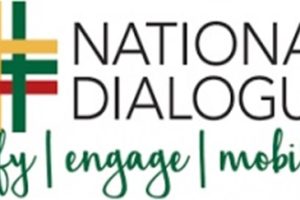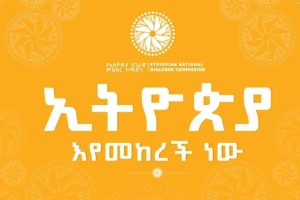
In a diverse nation like Ethiopia, where different ethnic groups coexist, fostering national dialogue is crucial for promoting unity and harmony. One powerful tool that can be utilized to achieve this goal is the media.
In the context of Ethiopia, where there is a diverse population with different cultural backgrounds and perspectives, the media can serve as a unifying force by providing a platform for individuals to voice their opinions and engage in constructive conversations.
For this reason, it is high time to utilize the media effectively because it plays a significant role in shaping public opinion, promoting diversity and influencing societal norms. In Ethiopia, where multiple languages are spoken and diverse cultural norms and values are practiced, the media can serve as a bridge to connect different groups and facilitate meaningful dialogues. Whether it is through traditional print or broadcast media or social media platforms, the reach and influence of the media are undeniable.
One of the key benefits of using media for national dialogue is its ability to reach a wide range of audiences simultaneously. Through televised debates, radio talk shows, or online forums, diverse perspectives can be entertained, shared, discussed, and debated. This not only enhances people’s understanding of different viewpoints but also fosters empathy and tolerance towards others.
While the media can be a powerful tool for promoting national dialogue, there are a number of challenges that need to be addressed. One such challenge is the presence of biased or sensationalized reporting that can perpetuate stereotypes and further divide communities. It is essential for media outlets to uphold professional standards of journalism and provide accurate, balanced, and unbiased information.
Additionally, the limited access to media in remote or marginalized areas can be a barrier to inclusive dialogue. To overcome this challenge and to ensure that all communities have access to diverse media sources and platforms, efforts should be made. This could involve expanding radio coverage, promoting local journalism initiatives, or leveraging mobile technology to reach underserved populations.
Currently, to curb the challenges and enhance the constructive role of media, various measures are being undertaken. The government is working closely with civil society organizations, public and private media as well as local communities to help leverage the collective efforts of various stakeholders to promote national dialogue through the media.
Recently, the Ethiopian Media Authority (EMA) has called on the media to play a critical role for the success of the historic initiatives, the national dialogue and transitional justice.
Ethiopian Media Authority Director-General, Mohamed Idris, told local media that the national dialogue and transitional justice have huge significance in the protection of human rights and ensuring lasting peace in the country.
Realizing national dialogue and transitional justice are vital in building a strong nation, he noted, adding that the active role of all sections of the society will significantly contribute to the success of the processes.
In this regard, the mass media has the responsibility of creating a clear understanding among the general public about the issues and refrain from reports that hinder the process, Mohamed underscored.
The Director General said that the Authority will continue to play its role in providing capacity building training for media personnel to enable them to cover and report issues ethically and with integrity.
According to him, the national dialogue and transitional justice will define the future of the country and are of great public interest.
For Mohamed, media has a crucial role in creating awareness about national dialogue and transitional justice among the public so that they can participate in the process with a spirit of ownership.
He recalls that, the government of Ethiopia recently reaffirmed its commitment to implementing transitional justice and national dialogue which are essential to ensure lasting peace.
Under the leadership of Prime Minister Abiy Ahmed (PhD), the Ethiopian government has adopted a comprehensive approach to address the root causes of internal conflicts, paving the way for a more harmonious future.
Moreover, fostering national dialogue has become a crucial goal to address various socio-political challenges that the country has been facing. With the rise of digital media platforms, there is an opportunity to harness the potentials of media to facilitate and promote constructive national dialogue among citizens.
Experts emphasized that; media should be utilized accordingly to promote national dialogue through promoting diversity, encouraging debate, fact-checking among others.
No doubt, media outlets can showcase diverse voices and perspectives from various regions and ethnic groups in Ethiopia. By highlighting different viewpoints, media can help foster understanding and empathy among citizens if utilized properly.
Likewise, talk shows, panel discussions and interviews on media platforms can encourage healthy debates on important issues facing the country which in turn can lead to the exchange of ideas and solutions to common challenges.
What is more, the media plays a crucial role in fact-checking and verifying information before it is disseminated to the public. By promoting accurate and reliable information, media can help build trust and credibility among viewers.
Accordingly, the on-going digital transformation and the increasing access to the internet and social media platforms in Ethiopia presents an opportunity for media to reach a wider audience and engage with citizens in real-time. The expansion of community radio stations in the country can also play a crucial role in promoting grassroots dialogue and fostering connections among local communities. By providing a platform for marginalized voices, community radio can contribute to inclusive national dialogue.
In sum, it is imperative for stakeholders to work together to address challenges and seize opportunities for using media as a tool for positive change in the country. Harnessing the media’s potential to realize national dialogue in Ethiopia is essential for building a harmonious and inclusive society. By utilizing the diverse range of media platforms available; and implementing strategies to promote ethical journalism, diverse content, audience engagement, and collaboration with stakeholders, Ethiopia can create a conducive environment for meaningful conversations that unite rather than divide its people.
BY TEWODROS KASSA
THE ETHIOPIAN HERALD TUESDAY 30 APRIL 2024




